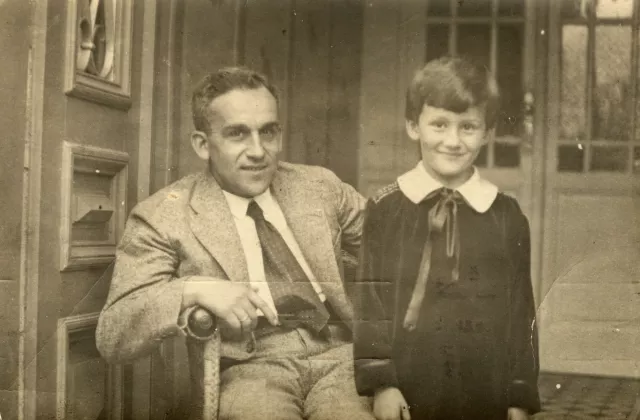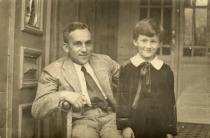In this photograph from 1930, I?m with my father, Emil Polak during a visit to Caslav at my aunt Marie Krausova?s.
My father was from Jicin, and moved to Luze to marry my mother. In Luze my parents ran a prosperous business, a general store with fabrics as well as some groceries like coffee, but they didn't sell bread for example, because there were three bakers in the area. The store was right in our building, made a decent amount of money and was fairly prosperous; my mother and father worked in it. But when Hitler came, my father had to close the store, and the only work they allowed him to do as a Jew was shoveling snow and similar menial activities. Our neighbor, who had a bakery next door to us, told my father at the time: ?Mr. Polak, if what happened to you happened to me, if they took my store away, I'd probably hang myself!? and back then my father said to him: ?As long as I'm with my family, nothing else can affect me.?
Religious life was, understandably, practiced in our family, if for no other reason, than because Grandpa, and later after him my father, were presidents of the Jewish religious community in Luze. I've got to say that it was tradition, that we lived in a religious fashion, but our family never went overboard with it.
We observed all the Jewish holidays, at least until Grandpa died. On Friday evening we'd light candles and pray, though I never understood the prayers at all, I had them memorized and always recited them exactly. But I wouldn't say that observance of holidays was done in some affected fashion, to me it's more this traditionalism than some sort of religiousness. During the Sabbath the men would leave for the synagogue, they dressed up in traditional clothing, carried prayer straps ? tefillin, and Grandpa covered his head.
My father had a sense of humor; I remember when the we were observing the Long Day [Yom Kippur], an all-day fast, they'd be praying in the synagogue, and as a joke my father says to the rabbi: ?Forget about all this here, come over to our place, we've got roast goose at home!? and the poor rabbi had to stay there and all day his mouth would water.
Anna Mrazkova with her father Emil Polak
Share
Photos from this interviewee
The Centropa Collection at USHMM
The Centropa archive has been acquired by the United States Holocaust Memorial Museum in Washington, DC.
USHMM will soon offer a Special Collections page for Centropa.
Academics please note: USHMM can provide you with original language word-for-word transcripts and high resolution photographs. All publications should be credited: "From the Centropa Collection at the United States Memorial Museum in Washington, DC". Please contact collection [at] centropa.org.






































